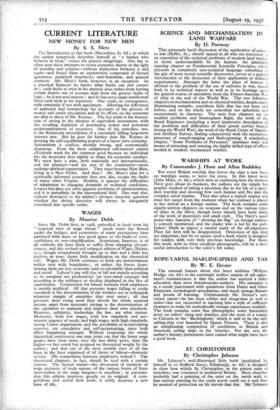CURRENT LITERATURE
The Introduction to this book (Macmillan, 8s. 6d.), in which the author tentatively describes himself as " a banker who believes in God," rouses the gravest misgivings. One has so often seen these attempts to recast economic theory in the light of morality and religion—without distinction between is and ought—and .found ihern an unattractive compound of factual ignorance; analytical ineptitude, anti-Semitism, and general crankery. Mr. Metz's book, hOweveri is an exception. As a practical financier he knows what banks can and cannot do ; such faults as arise in his analysis arise rather from leaving certain factors out of account than from the grosser faults of logic ; he is not anti-anyone ; and he has not a single intellectual three-card trick in his repertory.' One reads, in consequence, with sympathy if not with agreement. Allowing for difference of approach and terminology his accounts of the process` of money 'and credit circulation and of its effects on the economy are akin to those of Mr. Keynes. The key point is the frustra- tion of saving in the absence of equivalent investment, with the resulting depletion of purchasing power and perennial undereinployment of resources. One of his remedies, too, is the Keynesian prescriiition of a constantly falling long-term interest rate. But he goes far' further than Mr. Keynes in denying the self-equilibrating"powers of a laisser faire economy. Automatism is soulless, morally Wrong, and economically disastrous. Even the most enlightened - self-interest cannot -Effectively work for the common good because no individual has the necessary data rightly to shape his economic conduct. We must have a plan, both nationally and internationally, and the planners—and the rest of the community—must undergo spiritual regeneration. They must become New Men, living in a New Order. And then ? Mr. Metz's plan for a spiritually informed economy does not,- alas, escape the faults of many other Utopias. Notably, it ignores the difficulties of adaptation- to changing demands or technical conditions, it-raises but does not solve gigantic problems of administration, and it is unrealistic in the international field. One may also, without disrespect to the author's obvious sincerity, question whether the divine direction will always be adequately translated into specific ternis.






































 Previous page
Previous page